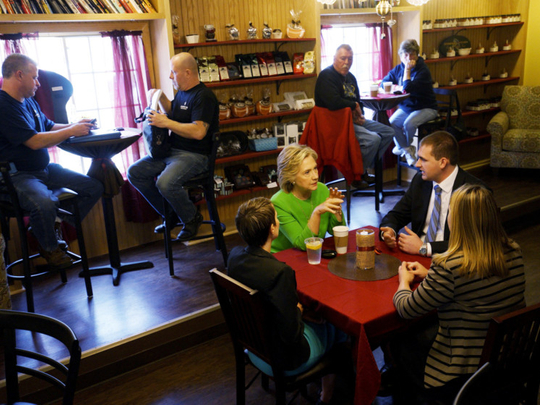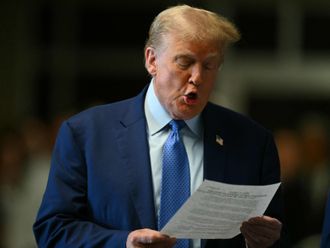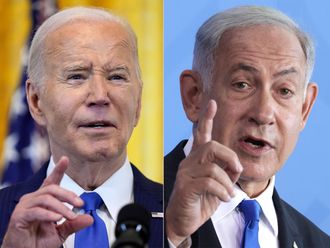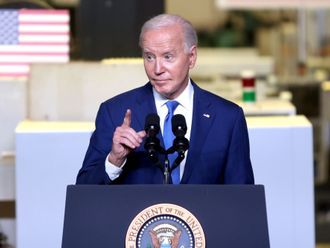
Monticello, Iowa: Hillary Rodham Clinton on Tuesday began to sketch out a presidential campaign focused on persistent economic difficulties facing Americans, making her case with a tacit acknowledgement of the limited success on that front under the Obama administration.
Her first campaign day since her Sunday announcement was equal parts travelling circus and listening tour, taking place in the state that started her slide toward defeat in the 2008 contest.
Clinton adopted a populist air at her first public event, which was held in an auto shop at Kirkwood Community College’s Jones County Regional Centre. She toured the facility and then sat at a table with teachers and students, under two vertical car lifts.
“I think we all know that Americans have come back from some pretty tough economic times, and our economy and our country are much better off because American families have basically done whatever it took to make it work,” she said in introductory remarks. “But I think it’s fair to say as you look across the country, the deck is still stacked in favour of those already at the top. And there’s something wrong with that.
“There’s something wrong when CEOs make 300 times more than the typical worker. There’s something wrong when American workers keep getting more productive ... but that productivity is not matched in their paychecks. There’s something wrong when hedge fund managers pay lower tax rates than nurses or the truckers I saw on I-80 as I was driving here over the last two days.
“So we’ve got to figure out in our country how to get back on the right track,” said Clinton, who had received strong support from big business in past campaigns.
Clinton’s first appeal was deeply focused on Iowa — besides the interstate reference, she touted the college debt levels of the state at one point. But she also used the visit to remind voters of the biography of one of the world’s best-known women.
She recounted her mother’s abandonment as a child, her father’s work as a small-business man, her church’s teachings about helping others, her lawyer work for the Children’s Defence Fund, her efforts to pass a health care initiative — which failed — a successful program for children’s coverage as first lady, her work as a New York senator after the September 11 attacks and her tenure as secretary of State.
She said the country faced “four big fights”: building “the economy of tomorrow, not yesterday,” strengthening families, protecting the nation’s security, and getting “unaccountable money” out of a dysfunctional political system. She raised the prospect of a constitutional amendment to block the sorts of campaign donations that have been used by all sides — Clinton herself is expected to benefit in 2016 — but have particularly helped Republicans.
During an education round-table, Clinton said she supported President Obama’s proposal to make community college free. She also backed the controversial national standards known as Common Core that have drawn opposition among both social conservatives and liberals.
“Common Core started off as a bipartisan effort — it was actually non-partisan, it wasn’t politicised,” Clinton said. “It was to try to come up with a core of learning that we might expect students to achieve across our country, no matter what kind of school district they were in, no matter how poor their family was. That there wouldn’t be two tiers of education.”
Clinton spent much of the hourlong discussion asking questions of the students and educators, leaning in with her chin resting on her hand, nodding and murmuring “mmm-hmm” in agreement.
The panellists included a single mother of three who had returned to school and relied upon work study and a Pell grant, an instructor who lamented divisive debates over education policy, and a high school student who earned nearly two years of college credits through a partnership between her school and Kirkwood.
Jason McLaughlin, the principal of Central City High School, noted that students not only earned credits that allowed them to spend less on college tuition, but also experienced how a college operates, preparing them for their own time on campus.
Clinton chimed in about her experience: “I was so scared,” she said. “Really! I called home and said I wanted to go home. Called collect in those days.”












